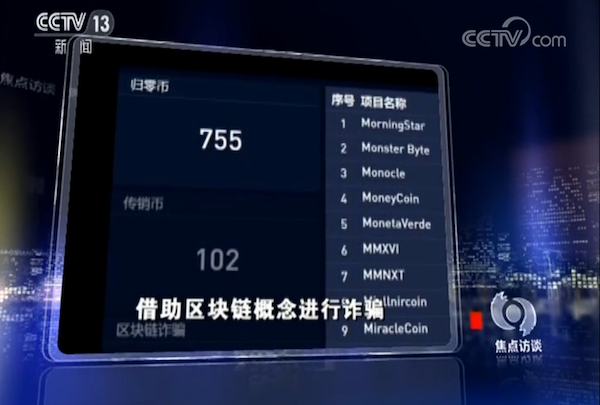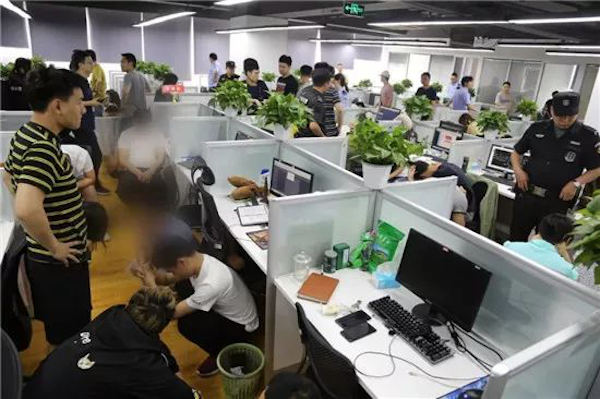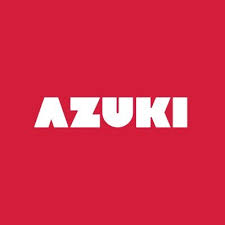The currency circle "剿匪": the fund is checked, the exchange is full, and the "catch" has just begun.

Shanghai, Beijing, Dongguan, Hangzhou, Henan, Inner Mongolia and other places have been supervised by the “swords”, and the activities related to digital currency transactions are thoroughly investigated.
At the same time, the official Weibo of the currency security and wave field were sealed. Prior to this, there were also domestic exchanges that were allegedly defrauded by the police.
A new round of rectification actions is underway in the blockchain industry .
- The sentient beings under the blockchain boom: Some people enter the market and some people sneak into the nose
- Getting started with blockchain | What is the difference between a mine pond and a mine?
- How much is the blockchain virtual bank?
According to a person close to the supervision, “the traditional media has recently begun to report blockchain chaos and encourage people to provide clues. The capture of the entire industry has just begun.”
A prophecy seems to be coming true: "The first thing the regular army goes into the mountains is."
Recently, from the People’s Daily, Xinhua News Agency to CCTV, many central media began to focus on blockchain chaos.
Various air coins, pyramid money, and fund trays with the blockchain flag became the object of everyone’s shouting.
On the evening of November 18th, CCTV’s “Focus Interview” pointed out that the most important thing to strengthen supervision in the blockchain wave is digital currency.
"Focus Interview" also named the interest fund, BeeBank and other fund scams, pointing out that "blockchain is not a 'cash chain'."

"Focus Interview" current program screenshot
Shanghai, Beijing, Dongguan, Hangzhou, Henan, Inner Mongolia and other places have also been “swords”, and the activities related to digital currency transactions are thoroughly investigated.
On November 13, the Beijing Municipal Bureau of Local Financial Supervision issued the “Risk Tips on Unauthorized Trading Activities of Branches of Trading Sites”.
The "tips" clearly pointed out: "If there is a foreign exchange trading venue (focusing on financial asset exchanges) branches operating activities in Beijing, it is a violation of business practices."
In fact, almost all digital currency exchanges operating in China, servers are located overseas, and registered shell companies overseas. Strictly speaking, they all belong to the “foreign exchange place”.
On November 14, under the leadership of the Shanghai Mutual Rehabilitation Office, the Shanghai Financial Stability Joint Office and the Shanghai Headquarters of the People's Bank of China jointly issued the Notice on the Implementation of the Renovation of Virtual Currency Trading Places.
The notice shows that the focus of this remediation is on virtual currency-related activities, including virtual currency transactions, currency and fundraising, as well as advocacy and drainage for exchanges registered overseas.
There is no doubt that regulators are trying to conduct penetrating regulation of the blockchain industry.
"It is straightforward to say that by setting up a foundation in Singapore, adopting the VIE structure, and using overseas identity to issue money abroad, the nature of 'illegal public financing' cannot be concealed. It still belongs to a position that is not allowed by Chinese law and will be banned. Processing." Xiao Wei, director of the Bank of China Law Research Association, said.
It is not difficult to see from the two regulatory documents that digital currency exchanges have become the focus of the regulatory authorities.
According to the 21st Century Business Report, on November 18th, the subordinate departments of the China Insurance Regulatory Commission issued documents to the provinces and cities to prevent the illegal fund-raising risks in the name of “blockchain”.
The document also encourages the masses to actively report, and those eligible will be rewarded, ranging from 5,000 to 100,000 yuan.
In response, some people joked: "There is no way to speculate on coins, and report to get rich."
There are also exchange practitioners who said: "The regulator has launched the 'people's war."
“Hangzhou has an exchange that has been “one-pot” by the police.” At the end of June this year, a gossip was widely spread in the currency circle.
On June 11, the Shangcheng police in Hangzhou did "blitz" a bitcoin exchange. In October this year, the police held a press conference and officially disclosed the news.
The exchange, which was seized by the police, was called "bit network." Unlike other Bitcoin exchanges, once a potential customer is encountered, BitNet will pull them into the WeChat group. In it, except for one or two real investors, they are the "teachers" and "trusters" of the platform.
The "teachers" are pointing out the market within the group, while the "tally" is taking a screenshot of the false earnings, tricking investors into investing. What is even more frightening is that the exchange can control the price of bitcoin in the platform at will, and the gambling with investors is the platform itself.
The Shangcheng police in Hangzhou said that in June, more than 200 people involved in the gang were arrested, and the funds involved in the case were seized, frozen and detained for more than 30 million yuan.
After investigation and evidence collection, more than 100 employees of Bitnet were criminally compulsory by the police.

Police arrest scene
The fraud gangs on the bitcoin exchange were smashed and the head exchanges were not good.
On the evening of November 13, the official microblog of the currency security was suddenly blocked, and the account content and fans were also cleared.
“The currency Weibo was blocked and may be related to its legal currency transactions.” Li Liqiang, an industry insider, told a blockchain, “He said in July that the currency will open domestic legal currency transactions. Zhao Changpeng also said that domestic users can use WeChat in the future. Alipay buys coins in the currency."
In his view, the currency "safety" in the "9.4" period, and later went abroad, has also been incompatible with the supervision. "Zhao Changpeng was born in China, grew up in Canada, and later worked in Japan. The benefits he brings to the currency security are internationalization; the disadvantage is that he does not understand China."
Some exchanges can't come back, and some exchanges are running hard.
On November 18th, the Science and Technology Daily reported that in order to avoid supervision, the founder of the Matcha Exchange has gone abroad.
In 2019, Matcha MXC is the deserved black horse exchange. The way it rises is to absorb a large amount of funds.
The most well-known one is the "Resonance Coin" VDS. It is also one of the most popular funds in the currency circle this year. In a month, VDS raised more than 3,400 bitcoins with its original “resonance model”, and the price of the currency rose more than 50 times.
The innovative area of Matcha is the most important trading venue for VDS, and VDS has also brought a lot of traffic to Matcha. The matcha that tasted the sweetness has not been accepted since then, and has been on the line of LDS, HDS, FDS and other popular money, and has harvested a large number of players.
The fund disk has also become the target of regulatory focus.
In the second half of this year, the project was continuously funded and investigated by the police until the arrest.
The PlusToken trader fled to Vanuatu and was sent back to the country. Interesting steps were investigated by Changsha police. The "ICC Network Red Chain" was investigated by Xi'an police. The fund disk with the blockchain flag is being fully encircled.
Under the shock of supervision, the collapse of the fund disk is getting faster and faster, and speculators who are trying to "seek for the rich and the danger" have begun to withdraw.
"PlusToken runs for one year, WoToken runs for half a year. BeeBank, which was exposed by focus interviews in the previous two days, ran for a week." Some investors said that "the blockchain hotspots have been used to swindle money." It won't go down."
According to the Focus Interview, the National Internet Emergency Center has monitored 755 kinds of air coins and 102 kinds of pyramid money. The end of the fund and the currency is not far off.
The focus of regulation is not only on the funding disk itself. The wave field of the wave disk wallet, the wave field super community and other fund disk projects, the official microblogging was also banned on November 15.
"There are indications that the target of the country's current crackdown is all kinds of scams under the banner of the blockchain, such as pyramid money, fund trays, false exchanges, etc." Some insiders speculate that "the country hopes to develop blockchain technology." It will definitely be the first name for technology."
Taking the mining industry as an example, in April this year, the National Development and Reform Commission issued the “Guidelines for the Guidance of Industrial Structure Adjustment (2019)”, and included virtual currency mining as “eliminated industries”. However, in the official document released on November 6, the virtual currency mining has disappeared in the industry.
At the same time, however, in Inner Mongolia, where the mining industry is concentrated, the Ministry of Industry and Information Technology has once again inspected and rectified the virtual currency mining industry. The key points are to package the mines into “big data, blockchain industries” and enjoy Enterprises with electricity price, land, and tax incentives.
"Now the mines in Inner Mongolia and Xinjiang are more honest than before, and they are all trying to do compliance." The miner Zhang Chao told a blockchain.
"Coin security, wave field microblogging was sealed, clearly conveyed the regulatory attitude: blockchain should be promoted, but not allowed to speculate, not allowed to issue coins." Laibit mine pool founder Jiang Zhuoer said on Weibo .
He believes that in the long run, speculating coins and issuing coins are the two major channels for the distribution of coins and funds to cut amaranth. The funds of investors are also mainly drawn from these two channels.
"For example, the wave field raised more than a billion dollars of ETH, and finally sold ETH, took more than one billion dollars from the market, and cut countless leeks," he said.
In response to the "Shanghai-like three types of virtual currency-related activities", Zhu Youping, deputy director of the China Information Network Management Center of the National Information Center, commented in a circle of friends: "To combine the leaders' speech and strict supervision, we can accurately grasp the policy supervision intention."
He believes that "the pass-through economy and community economy are the soul of blockchain business", which is only theoretical. In practice, blockchain projects must comply with regulatory requirements, otherwise all “benefits” are sinful and large.
A campaign for the blockchain is starting.
* Some of the respondents in the text are pseudonyms.
We will continue to update Blocking; if you have any questions or suggestions, please contact us!
Was this article helpful?
93 out of 132 found this helpful
Related articles
- Policy reshuffle is intensified: the crisis and new life of virtual currency exchanges
- Ping An’s account book is submitted to the prospectus, and the “blockchain first share” dispute opens.
- There is no “coin” in the blockchain advocated by the state, but the four big dividends or the ten-year encounter
- Blockchain Weekly: The currency circle is on the high side of supervision, and the first share of the mining machine will go to the US this week.
- Getting started with blockchain | What is blockchain, mining and trusting machines
- Observation | How Xiong'an integrates “blockchain thinking” into urban genes
- DAG: The next tipping point in the blockchain industry?






